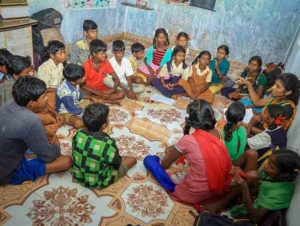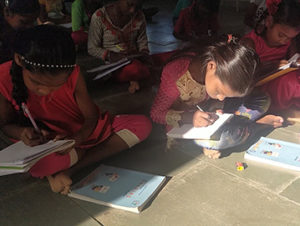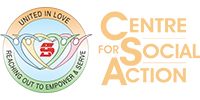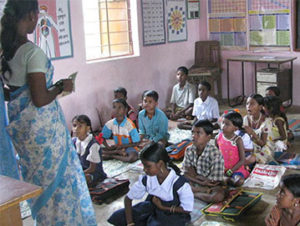
Centre for Social Action strives to restore the dignity of the vulnerable children and bring about an equal and value-based education by providing support structures ensuring their right to education and building in them civic consciousness so that they take small initiatives to build their communities.
 Bal Sabha
Bal Sabha
Children are one of the most vulnerable groups of our society. The children from marginalized and underprivileged communities are deprived of their basic rights and many a times become victims of violence within their families and society. We work on child rights through partnership with our Community Based Organizations (CBOs) in three districts, viz. Raigad, Dharavi Island (Bhayander West) and Mumbai.
A Bal Sabha, also known as Children’s Parliament, is formed by bringing together children from a village or institution between the ages of 8 and 18. This platform allows children to express their views and share their opinions, regardless of their socio-cultural background or any disabilities they may have. Through various play-way activities, they are sensitized about their rights, which helps them develop a civic and social conscience.
Through the structure of Bal Sabha, children learn to take up community issues and resolve the same through democratic values and framework. It offers children an opportunity to experience democratic decision-making and learn about their rights and powers as citizens; thereby, developing the community and making active citizenship a reality.
 English Literacy Classes (ELC)
English Literacy Classes (ELC)
The children from economically backward & marginalized communities who study in vernacular mediums have relatively lesser opportunities to compete with children from English medium schools. Moreover, the local school teachers and the parents of the children are not able to coach the children sufficiently well. As a result of such gaps in their learning of the English language they are not able to read, write or speak the language and thus lose out on lots of opportunities. Further they lose their own self-confidence resulting in opting out of school and even available livelihood opportunities for the future.
The “English Literacy Program” is designed to supplement the educational capacities of the economically backward children from rural communities. This Course is conducted in collaboration with a Mumbai based non-profit organization through its “Leap for Word” (LFW) program. Through this course the child’s ability to grasp, read, speak and later also write the English language with ease and grammatical accuracy is enhanced.
Supplementary Classes
In Raigad we work with the Kathkari tribe which is one of the most backward tribes in the country. Their main source of income is from agricultural labour on land owner’s fields during the agricultural season. Once the cultivation is over, they migrate to distant places as brick kiln or daily wage labourers. Due to migration the children are dropped from schools and their vulnerability is very high in terms of health and education. With continuous dropping out from school every year, there comes a point where they become unfit for our education system. They then grow up uneducated and end up doing the same as their fathers and grandfathers. As a result, the tribal community by and large has a very low literacy rate and they are an exploited lot with regard to account of their wages due to illiteracy.
To end this vicious cycle of generations of people growing up uneducated, CSA along with its partner organisations has been conducting supplementary classes for the Katkari children. The Wadi Prerika (Village Social Worker) conducts these classes in the village for the students after school-hours or once they return back from the place where they had migrated to. CSA has also provided these supplementary classes with a cupboard full of charts and posters as educational tools to be used.
These classes provide a support structure to vulnerable children in order to lower school drop-out rate, improve attendance and enhance their learning through a play-way method of teaching. It also improves the functioning of the schools by training the parents to participate in Parent-Teacher meetings and provides a mechanism to keep a check on the health and hygiene of the children.

